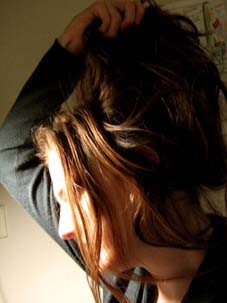 What you are about to read is really a curiosity.
What you are about to read is really a curiosity.Last year I stumbled over the notion of "cyber feminism". American Professor Donna Haraway is the woman behind the remarkable 'ism' and the idea is that feminists and women should consider that machines can contribute to liberation and close the gender gap. She writes:
“Up till now (once upon a time), female embodiment seemed to be given, organic, necessary; and female embodiment seemed to mean skill in mothering and its metaphoric extensions. Only by being out of place could we take intense pleasure in machines, and then with excuses that this was organic activity after all, appropriate to females”
Read more in Haraway's cyborg manifesto


1 comment:
I'll write this in English as I assume that you'd like your comments to be understandable to a more-international-than-Danish audience. :)
As I may have suggested at Cecilie's blog, Donna Haraway is one of my main influences in my own studies - as well as everywhere else, actually. Her way of breaching down the boundaries between male/female, nature/culture, organism/machine, etc. is to me a very inspiring way of seing the world from another mindset.
By no longer allowing ourselves to argue that "women are so and so", "nature is so and so as opposed to culture which is so and so", etc. we can challenge ourselves to bring new words and meanings into use when talking about issues about which we knew everything worth knowing. This also strengthens our ability to ask new questions to the world - which also strengthens our awareness of the role played by words in shapening how we understand the world including ourselves.
I hope that you can find some time to give her writings another shot. I agree that she's difficult to read. I read the Cyborg Manifesto for the first time two years ago, have read it many times, but it still puzzles and inspires me. That's the beauty of her writing, I guess - she tries to write in a way that keep meanings fluid, so to say, in order to show one of her more banal points: "There are always more things going on than you thought!" This statement has inspired me to be especially cautios when I encounter a field which seems plain and simple - to ask: "What am I missing because I haven't noticed its presence here yet?"
Sorry - this was a long comment. I hope that it wasn't too much of a bore.
Post a Comment